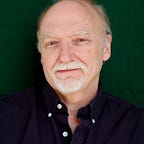When W.R. Hearst and Marion Davies Went to Germany to Meet Hitler
In the new David Fincher movie on Netflix, Mank, newspaper baron William Randolph Hearst (Charles Dance) is a key character. His actions in helping to defeat Upton Sinclair in his 1934 race for governor of California helps inspire Herman Mankiewicz (Gary Oldman) to write the screenplay for Citizen Kane and base the title character on Hearst. Marion Davies (Amanda Seyfried) also plays a crucial role. I wrote about all of this, and much more, in my award-winning book on the wild and influential Sinclair race and the backlash it produced, The Campaign of the Century. This was also Hollywood’s first plunge into politics — and the Sinclair threat led to the invention of the modern political campaign run by spin doctors, consultants, big business funding schemers, and advertising honchos.
Unmentioned in Mank is the Hearst and Davies tour of Europe in the middle of that campaign — and the publisher’s notorious meeting with Adolph Hitler. Here is an excerpt from the book, see more or order here.
____
W.R. Hearst was having such a fine time overseas in late-August 1934 it was hard to get agitated about anything back home, even the prospect of Upton Sinclair’s socialism coming to California. Oddly, more than twenty years earlier, it was Sinclair who predicted that socialism would come to America when Hearst was one day elected President.
Hearst had assembled a sultanesque entourage, with his three sons and their wives joining his mistress, fading actress Marion Davies, a dozen other high-spirited junketeers, and Miss Davies’s dachshund, Gandhi. He hoped to collect the usual bounty of rare antiquities and observe two of Europe’s fascist leaders at close hand.
After a few weeks in Spain, Great Britain, and Africa, Hearst had watched Mussolini harangue a huge rally in Italy, and was disappointed when il Duce expressed little interest in seeing him. Louis B. Mayer, head of Metro-Goldwyn-Mayer, suggested that W.R. seek an audience with Hitler and use the opportunity to put in a good word for the Jews. Hearst’s longtime support for Germany weighed in his favor, and the publisher had a friend in Berlin: Hitler’s foreign press officer, Dr. Ernst Hanfstaengl, a Harvard-educated con artist widely known by his nickname, Putzi.
When Hitler won a smashing victory in the August 19 plebiscite, gaining the title of president (in addition to that of chancellor) of Germany, Hearst told Hanfstaengl, in a published interview, that “anything benefiting Germany will eventually benefit the entire world . . . The struggle of Germany for liberation from the iniquities of the Versailles Treaty, and for freedom from the malignant oppression and compression of nations which are selfishly but shortsightedly hostile to her progress, is a struggle which should be watched with sympathetic interest by all liberty-loving people everywhere.”
He hoped that Putzi could arrange a conference with Hitler sometime in September. The fact that Hitler had just expelled journalist Dorothy Thompson from his country did not deter W.R. in the least.
Arriving in Berlin in mid-September, Hearst managed to arrange his meeting with Hitler, but was desperate to keep the bubbly Marion Davies from accompanying him. So he designed a ploy to keep her out of sight.
When Marion made it as far as the Berlin airport, her friend Ruth Selwyn awaited her. Ruth begged for help — she needed seven hundred dollars to pay off a hotel bill. Hearst told Marion to run along to the hotel; he would meet up with her later, and then they would visit Hitler. Marion dashed off while W.R. and Putzi Hanfstaengl rushed to the presidential palace on the Wilhelmstrasse. Hanfstaengl would serve as interpreter.
After a brief exchange of pleasantries, the chancellor quickly came to the point, demanding to know why he was so “misunderstood” and despised in the United States. Hearst explained that Americans loved democracy; it was as simple as that. Hitler replied that he was product of democracy, having been elected by an overwhelming vote of his people.
Hearst didn’t know quite how to respond to this logic. As recently as four weeks ago, Hearst himself had praised Hitler for rallying the public will. Now he informed Hitler that it was not the structure of German government but some of its policies concerning a certain unnamed group of citizens that smacked of dictatorship. W.R. was speaking in code, but Hitler got the message. He reminded the publisher of how poorly America treated the Indians. He also assured Hearst that discrimination against particular groups in Germany was disappearing, and that it was government policy to wipe it out entirely.
Hearst, gratified, assured Hitler that this would raise his standing in America considerably, and W.R. left the meeting convinced that he had accomplished something. Stepping outside, he found photographers waiting, not something he had particularly counted on. They had him pose with Dr. Alfred Rosenberg and other influential Nazis. Asked to comment, Hearst replied, “Visiting Hitler is like calling on the President of the United States. One doesn’t talk about it for publication.”
Then Hearst and his party drove over to his hotel. He rang up his mistress from the lobby. “The plane’s ready,” he said. “What about Hitler?” Marion asked, furious, smelling a rat.
“I just went in for five minutes and then I left,” Hearst explained meekly. Marion was not mollified. She vowed not to speak to W.R. for the rest of the day.
Greg Mitchell is the author of a dozen books. More on The Campaign of the Century. It was recently selected at the Wall Street Journal as one of the five greatest books ever about an American election.
